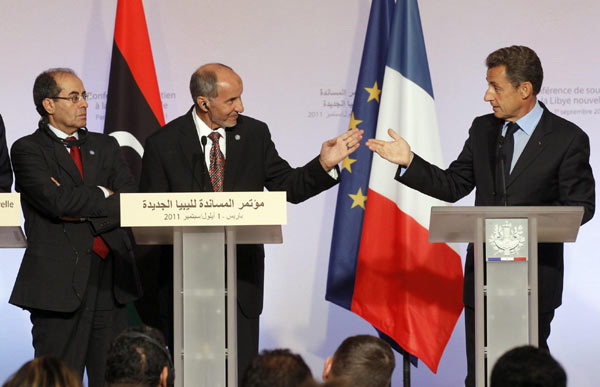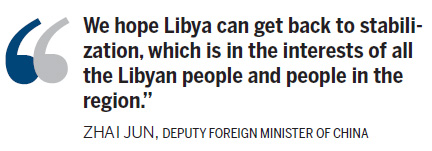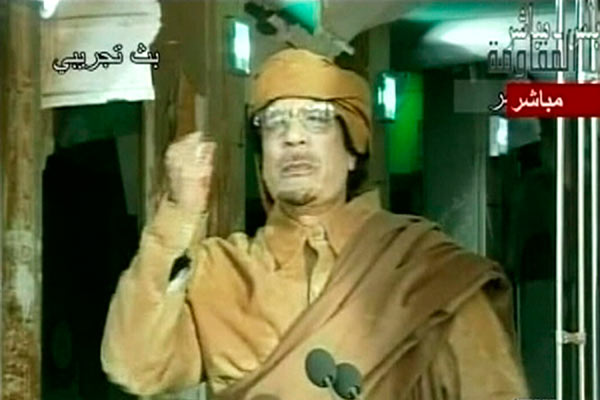Politics
China's contracts 'safe' in Libya
Updated: 2011-09-03 07:40
By Fu Jing and Ma Liyao (China Daily)
 |
|
France's President Nicolas Sarkozy (R), Mustafa Abdel Jalil (C), chairman of the Libyan National Transitional Council (NTC), and Mahmoud Jibril (L), the head of Libya's rebel National Transitional Council, hold a joint news conference at the "Friends of Libya" conference at the Elysee Palace in Paris, Sept 1, 2011. [Photo/Agencies] |
BRUSSELS / BEIJING - Libya's National Transitional Council (NTC) said it will respect business contracts and agreements signed with China before the war, said Deputy Foreign Minister Zhai Jun.
Saying China has great ability and potential to help rebuild the country, especially its infrastructure, Zhai urged the NTC to form an "inclusive government".
Zhai met with NTC leaders on Friday, joining 63 countries and international organizations at Thursday's Paris conference on Libyan reconstruction.
"We hope Libya can get back to stabilization, which is in the interests of all the Libyan people and people in the region," said Zhai following a speech at the meeting, which was hosted by France and the UK.
He said China respects the choice of the Libyan people, and the international community should respect the country's independence and integrity. "The post-war arrangement in Libya should be led by the United Nations," Zhai said.
Before the war broke out and they were evacuated, more than 35,000 Chinese, mostly construction workers, were in Libya.
"So I think we can play a big role in the reconstruction of Libya," said Zhai.
 |
Promises and timetables were the biggest achievements of the two-hour conference on Libya's reconstruction, as the international community gradually unfroze Libya's assets and de-listed the economic entities under sanction.
French President Nicolas Sarkozy said that all nations at the meeting were committed to returning frozen assets to the Libyan people.
The BBC reported that closed-door talks were continuing on Friday between representatives of those nations and Libya's interim authorities to determine how to spend $15 billion in unfrozen funds.
But Chinese scholars said the reconstruction of such a war-ravaged country, with more than 860,000 people fleeing its borders, will not be an easy task.
The rich resources of oil and gas are part of the reason Western countries are active in Libya, said Zhang Xiaodong, a researcher with the West Asian and African Studies Institute at the Chinese Academy of Social Sciences.
But he added that before the disorder in Libya, its oil and gas mostly went to the European market, so the situation is simply returning to the way it was.
With war not entirely ended in Libya, it is hard to tell whether the process of reconstruction can proceed as Western powers hope.
Because most of the important resources, like money and oil, are still controlled by the Western world, it will be very difficult to realize the promise of keeping reconciliation and transition a Libyan-led process, said He Wenping, an expert on African studies at the West Asian and African Studies Institute.
"The bidding process for Libyan oil and gas in the future should be transparent," He said.
 |
|
A still image of Muammar Gadhafi is displayed to accompany his audio message broadcast by Arabic news channels Al-Arouba and Arrai, Sept 1, 2011. [Photo/Agencies] |
Thursday saw the 42nd anniversary of the emergence of Col Gadhafi as Libya's leader, and despite the success of the rebellion against him, Gadhafi vowed in an audio message broadcast on a loyalist TV channel that he would never surrender. Sarkozy, who chaired the meeting, said air strikes would go on as long as Gadhafi was a threat.
NATO Secretary General Anders Fogh Rasmussen said the future of Libya rests on reconciliation, unity and rule of law, not on repression, division and injustice.
While the United Nations will take the lead in supporting the Libyan people and the NTC throughout that process, NATO stands ready to play a supporting role if and when asked, Rasmussen said.
China Daily

Specials

Jewel of the south
Zhuhai in South China has a wealth of natural allure that is open for business.

China in vogue
How Country captured the fascination of the world's most powerful fashion player

More than just a game
Mahjong is a deep-rooted cultural tradition that touches every level of society